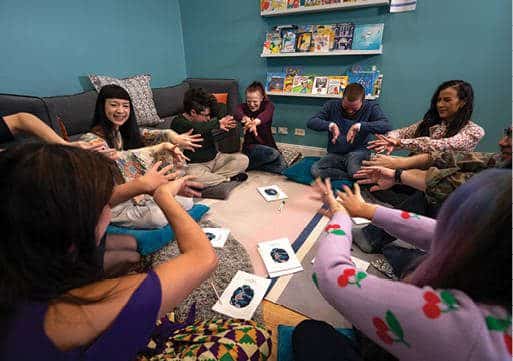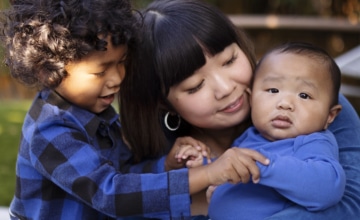Nat Vikitsreth, Come Back to Care, Chicago, Illinois

Abstract
When practitioners move beyond professional niceness to embody honest human connection in our field’s relationship-based work, true belonging and equity emerge. With such radical honesty, foundational concepts, such as therapeutic alliance and attunement, will be explored through the lens of social justice. In other words, we are “queering” ways of being by explicitly exploring intersecting identities, power, and privilege with the caregivers we serve. Using a blend of personal narrative, clinical insight, and social justice practice, I share what therapeutic alliance can be like without “powerblindness” and what attunement can feel like with boundaries and accountability.
Ziggy loved nothing more than to shake his favorite toy and delight in its swirling colorful lights. His family and I would begin each of our early intervention home visits with this light-up toy. One day when Ziggy had an ear infection, he placed the toy right next to his ear. Newly attuned to the whirring sound which accompanied the toy’s swirling lights, he carefully alternated between listening to his toy and looking at it closely. His curiosity led him to peek under this toy where he found a mysterious on-off switch. Without any delay, Ziggy flicked the switch on. The room was suddenly filled with a mixture of the toy’s catchy tunes, Ziggy’s belly laugh, and his mom’s lament, “Oh no.”
Ziggy’s delight and discovery in something so familiar always inspires me to look at our field’s business-as-usual concepts from new angles. Instead of discovering an on-off switch like Ziggy did, I hope to practice Audre Lorde’s teaching (1984) that “the master’s tools will never dismantle the master’s house” (p. 110) while looking at a foundational concept of our field: Jeree Pawl’s “How you are is as important as what you do” (Pawl & St. John, 1998). With Lorde’s radical honesty and Ziggy’s curiosity, I believe we can expand the ways we serve families and children to include a whole spectrum of practices that go beyond “the master’s tools,” or standards which privilege a White, middle-lass, cisgender, heteronormative, and able-bodied experience. More important, with this multiplicity at the heart of the care we provide to families and children, we can uphold everyone’s humanity, ours included.
When we center this multiplicity in the care we provide, the question of “What shapes how you are” becomes as important as “How you are.” The factors that shape how we are include our intersecting identities and the power and privilege of those identities. When we get past perfunctory, “professional” niceness and get real about these aspects of our humanity, the family–practitioner relationship can go beyond performative gestures toward diversity, equity, and inclusion to become a real, messy, honest human-to-human connection. Considering “What shapes how you are” with unflinching honestly also keeps us accountable about not unintentionally reproducing an oppressive status quo, or “the master’s house” in our therapeutic relationships with families.
In the following sections I use a blend of personal narrative, clinical insight, and social justice practice to hold the complex nuances of both the relational “ways of being” and the radical honesty of equity, belonging, and liberation. This integration of my community organizing experiences and infant mental health training begins with a definition of queering, a political framework borrowed from Queer theory. Then, I will queer two foundational concepts in our field: therapeutic alliance and attunement. Together we will tilt them to the side and find an opening where niceness is replaced by honesty, where therapeutic alliance includes power analysis, and where attunement comes with boundaries.
Queering as a Verb
Expanding our conception of “ways of being” to include identity, power, and privilege requires that we examine a central idea of our field with fresh eyes. To do this, we can borrow the notion of “queering” from Queer Theory (Jagose, 1996). In this context, to queer means to examine the business-as-usual, to agitate norms, to never stop asking questions, and to surrender the comfort of having one right answer (Kirsch, 2000). To queer means to question the categories and binaries and seek to find who benefits from these categories (Butler, 2004; Tilsen, 2021). To queer is to embrace multiplicity instead of accepting that a White, cisgender, heteronormative, able-bodied, middle-class way to do things is the standard everyone must align to. To queer is to ask “Who’s not at the table and why?” To queer is to dismantle the “master’s house” and build “everyone’s village” instead. To queer is to go beyond critiquing the field for the sake of critiquing. Rather, to queer is to make room for those pushed to the margins by White supremacy to join the table, feel belonging, and, as my trans “house mother” said, “live our best lives.”
Just like Ziggy explored his familiar toy from different angles, the rest of this article “queers” the familiar concepts of therapeutic alliance and attunement. By queering these concepts, we can find room in them to integrate social justice practices so that the care we provide is driven by equity and belonging.
Therapeutic Alliance Without Powerblindbess
When I started my infant mental health training 8 years ago, the word that I came across most often in the literature and in lectures was “relationship.” Zeanah and Zeanah (2010) wrote, “the relational focus of infant mental health has been the sine qua non of this field from the beginning. It is not the infant who is the target of intervention but rather the infant-parent relationship” (p. 234). When the infant–caregiver relationship is wrapped in a cued-in caregiver–practitioner relationship or therapeutic alliance, therapeutic change unfolds (Baier et al., 2020).
Being nice, kind, polite, compassionate, and having the unconditional positive regard encouraged by Carl Rogers (Farber et al. 2019) certainly serves as a solid starting point where the caregiver–practitioner relationship can take root. To nurture this relational seed, I believe that it also takes honesty, especially honesty that acknowledges the elephant(s) in the room that are power imbalances and hierarchies stemming from our intersecting identities and their privileges (McDowell et al., 2018). Although power and privilege silently shape how we show up to each encounter with families, they directly affect how we respond to stress, attune to families, and engage in co-regulation (Ogden, 2021).
Although our “nice practitioner” stance is a good start, it lacks the vigor we need to cultivate equity and belonging in the therapeutic alliance. In my own practice, this stance—one that glowed with a warm smile, a head tilted 45 degrees to the side, with a soft, pleasing tone of voice, and natural utterances of “umm,” “ahh,” and “tell me more”—certainly made me very likeable in my work with parents. However, my niceness and politeness came with an unintended consequence as well. They not only created a horizontal gap that kept families from connecting genuinely with me, but they also kept the vertical power hierarchy alive as well. The helper–helped dynamic, driven by my anxious questions like “How do I help ‘these people’?” turned out to be a barrier to forming meaningful (as well as equitable and inclusive) relationships.
As professionals, many of us may want to set our professional power aside and level the playing field to “empower” caregivers with our reflective questions instead of offering tips and strategies. McDowell, Knudson-Martin, and Bermudez (2018) called this tendency “the myth of neutrality,” which refers to the inability of those with power to see the power imbalance between themselves and those with less power. In other words, when we ignore the power differences between ourselves and caregivers, we are powerblind (Kurzman et al., 2014). When we buy into “the myth of neutrality,” we risk neutralizing our ability to act for social justice.
Powerblindness bypasses accountability and keeps us from recognizing our full humanity: it recognizes our own good intentions and compassion but neglects to consider our power, privilege, and social location (Crenshaw et al., 2019). It prevents us from seeing the power imbalances in between families and ourselves and from disrupting this imbalance/hierarchy (McDowell, 2015). Another dynamic that powerblindness plays out is called “unconscious supremacy” (Nieto et al., 2014). Those with power are conditioned by their privileges and reinforced by institutions that were built for them to believe that their worldviews are more legitimate, credible, and correct than those of people targeted by oppression. Left unchecked, this unconscious supremacy might be used unintentionally to justify our desires to offer tips and strategies before hearing a family’s full story (Gold, 2017). In addition, the idea of “empowering” or “affirming” our clients can sometimes keep the clients in the less powerful position as passive victims of oppression (Freire, 2000; hooks, 1994).

Expanding our conception of “ways of being” to include identity, power, and privilege requires that we examine a central idea of our field with fresh eyes. Photo: shutterstock/fizkes
Therefore, an honest take on therapeutic alliance includes power analysis. Power analysis asks who has power and access to resources and who doesn’t (Hernández-Wolfe, 2013), which goes beyond questions like “What was it like for you?” or “How does that make you feel?” McDowell, Knudson-Martin, and Bermudez (2018) asserted “awareness of power is a critical first step in engaging in ethical practice, regardless of theoretical orientation” (p. 31).
Analyzing my own power, I have the institutionalized or professional power evidenced in all the acronyms of degrees following my last name even though my race, gender identity, and immigration status are targeted by oppression. In this honesty, I come to realize that equity, belonging, and justice are not about understanding each culture or each gender so I know how to help a person with any possible intersecting identity. Which chapter in the “Multicultural home visiting manual” would you turn to when you see a client like me who is trans, Asian, immigrant, with a cis-passing privilege, and more importantly fabulous? With this honesty, I come to realize that equity and belonging in relationship is more about myself than the people I am trying to help. It is about knowing my own power, privilege, and the structural forces that keep injustice alive (Goodman & Gorski, 2015). For example, how can we go beyond treating a transgender parent’s depression so they can interact with their newborn in attuned ways to understand their daily struggles with employment discrimination, struggles which are exacerbated by the state’s near-impossible name change policy (Jefferson et al., 2013)?
Seeing clearly our own and the family’s power and privilege based on our respective intersecting identities, we will have an additional piece of information to enrich our clinical reasoning. We will be able to name the elephant in the room that is historical, collective, and systemic oppression. As a result, our blanket empathy statement of “I can’t imagine the pain you’re feeling” can be rooted in radical honesty and power-informed humility, for example, “Because of my class privilege, I’ve never experienced the same worry you shared at the grocery store checkout line. I can’t imagine the added stress when your toddler kept asking for the chocolate bars at the cashier’s. How was it for you to share what you were feeling with me just now?” Similarly, “How does that make you feel?” can be deepened and transformed into “With the history of breastfeeding in the Black community, I wonder how that historical and collective oppression is affecting you and your baby throughout the week.”
By being explicit about the historical, social, and cultural contexts we and our families are in, we can step in and exercise the power that comes from being a trained professional by holding space for families to reflect and see that their struggles are not about personal failures as caregivers. Instead, their struggles are collective, historical, and structural. Kotchick and Forehand (2002) wrote,
The research literature is less well developed in terms of our understanding of how the broader social and cultural environment influences parenting. In addition, clinical interventions designed to enhance adaptive parenting have paid little formal attention to context, and policy development has yet to fully embrace the broader ecology of parenting. (p. 266)
Through this storytelling that considers historical and cultural contexts, caregivers have an opportunity to name the unnamable and express the unexpressed, both of which mobilize the caregivers to unburden themselves from self-shaming and to see their child’s needs clearly (Gold, 2017; Schwartz & Sweezy, 2020).
Another way for us to decenter our power and privilege is by replacing “empowerment” with respect. The liberation of people targeted by oppression is not predicated on our gender-affirming care, empowerment, or acceptance (Smith et al., 2012). Instead of empowerment, respect the resilience in their resistance and nonconformity. Demonstrating this respect can take many forms, for example Bowleg (2021) asserted that we should ask “What is the good stuff? What is protective? On what resources do Black communities at diverse intersections draw despite injustice and inequity? Which strengths are harnessed for resistance and when?” (p. 241).
Much as therapeutic outcomes are co-created between caregivers and their therapists, therapeutic alliance with an honest power analysis is bidirectional. Power acknowledged and decentered, our clients can hold space for us to name the power imbalance and we can hold space for them to reflect on their oppression and resilience. When this decentralization of power generates mutual care or interdependence, authentic connections catalyze therapeutic changes (Baier et al., 2020; brown, 2021).
Attunement With Boundaries
Attunement between two people in any relationship involves reading verbal and nonverbal cues to understand when to step in and engage and when to back off and disengage (Tronick, 2007). When someone feels seen and understood or what Siegel called “feeling felt,” a sense of belonging emerges from this attunement (Siegel, 2020).
When the caregivers we work with “feel felt,” we also feel magnificently competent. It is incredibly satisfying when we click with our caregivers. While this attunement euphoria is real, I believe many of us can recall plenty of moments when attunement went sideways. Those moments when we said in our most empathic voices, “I can see you’re hurting. I get it.” only to have it immediately backfire when the caregiver puts things in perspective by saying, “Do you get it? Have you lost a baby like I did?” Moments like this hurt because many of us are in this helping profession because we want to help, to show compassion, and to provide deep care.
Siegel (2010) wrote “true attunement is risky business…the key to clinical attunement is to be willing to say ‘I don’t know’ and ‘tell me more’ ” (p. 43). But what happens when you literally cannot attune to the caregivers in front of you because of the differences in your intersecting identities—what Miranda Fricker (2007) called “hermeneutic injustice”?
Hermeneutic injustice (Fricker, 2007) refers to how the experiences of those targeted by oppression are neither easily nor readily understood because these experiences are vastly different from what the dominant culture deems “standard.” With such injustice, the larger society immediately validates one group’s way of being, speaking, doing, and looking as “appropriate,” “superior,” “credible,” “makes sense,” “mainstream,” or “right.”
An honest take on our field’s conception of attunement must take into account hermeneutic injustice. Only then can we invite in humility and own the fact that no matter how much we accept all the similarities and differences between ourselves and the caregivers we work with, being accepted is not the same as being understood (McDowell et al., 2018). Admitting this does not make us less nice, competent, or caring; it makes us real and honest.
Embracing this limitation of attunement is one way of keeping ourselves grounded in solidarity so that we do not show up for our families as saviors (Frey, 2020). As saviors, our genuine desire to help our caregivers might be out of balance. Our intention to “meet the parents where they are at” can be replaced by an unintentional “I need you to be someone I know I can attune to.” That is, I need you to be someone who’s warm to their baby, who reads books to their toddlers every night, who says things like “Oh I notice you’re feeling sad, tell me more.” This someone perfectly fits our field’s definition of an attuned and efficacious parent. Because we know how to attune to this parent, we might find that it is very easy to “click” with this parent. With an easy rapport, we can let the usual “Wow, look at how your baby’s connecting with you when you sing to her” roll of our tongues. And we feel great, wise, and competent.

Power and privilege silently shape how we show up to each encounter with families and directly affect how we respond to stress, attune to families, and engage in co-regulation. Photo: shutterstock/Rawpixel.com
How about those parents who look different from us, who do things differently from what we learned in school, and who express love to their children differently? How about those parents who we first label “too much” or “not enough” because we don’t immediately “click” with them?
An honest take on attunement requires us to “be real” and ask, “When the caregiver is of a different race, class, gender, immigration status, age, or has other intersecting identities, am I trying to fit them into the ‘good parenting box’ so that I know how to attune to them? Am I trying to turn Malia into Melissa or Kaleb into Kevin because I don’t know how to attune to their lives otherwise?”
In the same humility that we cannot always attune affect to affect with caregivers, we cannot attune to everything and everyone, especially when there are differences in intersecting identities, power, and privilege. When we face such differences, how do we transform a “nice” attunement into an honest one? In a word, with boundaries.
Prentis Hemphill (2021) said “Boundaries are the distance at which I can love you and me simultaneously.”
Recognizing hermeneutic injustice requires that we acknowledge that there is a space between the boundaries of our own experiences and those of the caregivers we work with. Practicing attunement while respecting those boundaries requires attuning to ourselves and attuning to the caregivers simultaneously. It requires attuning to our internal states and nervous systems (Siegel, 2010) and honoring our intersecting identities, privilege, and power simultaneously (Kaba, 2021). Respecting those boundaries, we do not have to force caregivers to fit in the “good parenting” box we have been trained to attune to. Nor do we have to disregard our own privilege and power for the sake of being nice and professional. We do not have to “convince” or “fix” because multiple truths and identities can co-exist (brown, 2021). Practicing attunement with boundaries recognizes hermeneutic injustice and admits we will never fully walk in someone’s shoes and get their experiences. We can hold all of these complex pieces together in discomfort without dishonoring each other’s dignity.

With radical honestly, we can wonder what it is about the intersecting identities, power, and privilege in the room that make attunement difficult. Photo: shutterstock/nimito
Having accepted the limitations of attunement, we must also extend the same level of honesty to the discomfort we feel when we are unable to perfectly attune to caregivers.
As practitioners, we are trained to respond to gaps in attunement by regulating our affect and nervous system (Siegel, 2020) so that we can repair the rupture (Tronick & Gold, 2020). I contend that we can benefit from not rushing straight to self-regulation and repairing the rupture. Instead, we can study the textures of our discomfort a bit more intimately beyond our affect dysregulation or attachment history. With radical honestly, we can also wonder what it is about the intersecting identities, power, and privilege in the room that make attunement difficult. When we understand this discomfort better, we can then regulate accordingly without either swooping in to help the caregivers like a savior or denying that the power imbalance exists.
To be honest about our discomfort, hold those boundaries, and cultivate belonging, our practice of attunement can be enriched by social justice’s practice of accountability. In particular, the notions of over- and underaccountability illustrate how failing to respect boundaries leads to misattunement.
Accountability means doing what you said you were going to do. When you make mistakes, accountability means owning your oops. It means navigating the fear of getting cancelled, the guilt of making the mistakes, and the shame of causing hurt and harm (brown, 2021; Kaba, 2021). When shame drives our accountability, our action risks falling into two categories: overaccountability or underaccountability (Haines, 2019). When we are in over- or underaccountability, we are in protection or survival mode, and we fall out of attunement.
Overaccountability is the kind of misattunement where we take on all the fault and blame (Haines, 2019). For White practitioners, overaccountability might have a texture of self-sacrificing martyrdom like, “Oh, I’m a White person with privileges. So, I must bring you new toys, books, diapers every week.” For Black, Indigenous, and other practitioners of color, overaccountability might like sound like, “Oh, that’s cool. Don’t worry about it. No, that wasn’t racist at all. You’re a doll. Bless your heart.” The flavor of centering the comfort of Whiteness above our own dignity is palpable. Sacrificing our dignity and boundaries to “attune” does not produce honest attunement where either party feels human connection or belonging.
Underaccountability is the kind of misattunement where we avoid or shrink away from accountability (Haines, 2019). For White practitioners, underaccountability might sound like, “I’m so grateful to learn from your experience. Thank you for being brave and sharing your truth,” without any subsequent action to address, improve, or change the situation. Gratitude does not absolve any of us from taking antioppression action (Kendi, 2019). In addition to gratitude, intellectualization is another form of underaccountability. Reading another book to get to the bottom of implicit biases will not make us better allies; making mistakes over and over again, owning our oops with integrity, and taking action toward equity and belonging will. Overriding the power imbalances and hierarchies or being ashamed of the privileges we hold do not produce honest attunement either.
Once we know what our discomfort is stemming from and can name it for what it is, we can regulate with grace instead of urgency or shame. In my own practice I self-regulate by alternating between top-down, cognitive self-talk and bottom-up, somatic practices. For example, Brené Brown’s affirmation (2010) “Don’t shrink, don’t puff up, stand your sacred ground,” and my trans house mother’s favorite saying: “I said what I said” both are helpful to me. Regulated, we can respect the caregivers’ and our boundaries while attuning to each other.
Using honesty and humility to pause, hold our boundaries, and leave room for multiplicity creates a fertile ground for equity and belonging to blossom. We attune nervous system to nervous system, affect to affect, and soul to soul because at the end of the day my liberation is bound to yours. As Lilla Watson put it (n.d.) “If you have come here to help me, you are wasting your time. But if you have come because your liberation is bound up with mine, then let us work together.”
Queer-clusion
Led by curiosity like Ziggy and inspired by the radical honesty of Lorde’s teaching, we queer the field with more queries: What does belonging look like when we replace niceness with honesty and when we unapologetically root relationship-based practices in social justice?
Niceness, politeness, and gratitude uphold White, cisgender, heteronormative, able-bodied, and middle class “ways of being,” which is an insult to my liberation and yours in equal measure. An honest appraisal of “how we are” is incomplete without considering “what shapes how we are.” However, when we consider our intersecting identities and the power and privilege that come with them, we can enrich therapeutic alliance with power analysis and use attunement with boundaries and accountability. To paraphrase a feminist assertion, the interpersonal is political. Only by honestly acknowledging the factors that shape our “ways of being” can we create true belonging.
Learn More
Author Bio
Nat Vikitsreth, LCSW, DT, CEIM, (she/her) is a dot connector, norm agitator, and community organizer. Ms. Vikitsreth works as a decolonized and licensed clinical psychotherapist, a social justice and somatics practitioner, a lecturer, and a host of the Come Back to Care Podcast (https://www.comebacktocare.com/podcast). She founded Come Back to Care (https://www.comebacktocare.com) to support caregivers of young children who want to build their families at the intersection of social justice practice and intergenerational family wellness.
Suggested Citation
Vikitsreth, N. (2022). Perspectives: Advancing equity, diversity, and inclusion: Queering “ways of being”: Replacing politeness with honesty to create belonging. ZERO TO THREE Journal, 42(4), 32–38.
References
Baier, A. L., Kline, A. C., & Feeny, N. C. (2020). Therapeutic alliance as a mediator of change: A systematic review and evaluation of research. Clinical Psychology Review, 82, 101921.
Bowleg, L. (2021). “The master’s tools will never dismantle the master’s house”: Ten critical lessons for Black and other health equity researchers of color. Health Education & Behavior, 48(3), 237–249.
brown, a. m. (2021). Holding change: The way of Emergent Strategy facilitation and mediation. AK Press.
Brown, B. (2010). The gifts of imperfection: Let go of who you think you’re supposed to be and embrace who you are. Hazelden.
Butler, J. (2004). Undoing gender. Routledge.
Crenshaw, K. W., Harris, L. C., HoSang, D. M., & Lipsitz, G. (2019). Seeing race again: Countering colorblindness across the disciplines. University of California Press.
Farber, B. A., Suzuki, J. Y., & Lynch, D. A. (2019). Positive regard and affirmation. In J. C. Norcross & M. J. Lambert (Eds.), Psychotherapy relationships that work: Evidence-based therapist contributions (pp. 288–322). Oxford University Press.
Freire, P. (2000). Pedagogy of the oppressed (trans: M. B. Ramos). Continuum International Publishing Group. (Original work published in 1970).
Frey, W. R. (2020). White fragility: Why it’s so hard for white people to talk about racism Robin DiAngelo [book review]. Journal of Social Work, 20(1), 123– 125.
Fricker, M. (2007). Epistemic injustice: Power and the ethics of knowing. Oxford University Press.
Gold, C. M. (2017). The developmental science of early childhood: Clinical applications of infant mental health concepts from infancy through adolescence. W. W. Norton.
Goodman, R. D., & Gorski, P. C. (Eds.). (2015). Decolonizing “multicultural” counseling through social justice. Springer Science + Business Media.
Haines, S. K. (2019). The politics of trauma: Somatics, healing, and social justice. North Atlantic Books.
Hemphill, P. [@prentishemphill]. (2021, April 5). Boundaries are the distance at which I can love you and me simultaneously [Photograph]. Instagram.
Hernández-Wolfe, P. (2013). A borderlands view on Latinos, Latin Americans, and decolonization: Rethinking mental health. Jason Aronson. hooks, bell. (1994). Teaching to transgress: education as the practice of freedom. Routledge.
Jagose, A. (1996). Queer theory: An introduction. New York University Press. Jefferson, K., Neilands, T. B., & Sevelius, J. (2013). Transgender women of color: Discrimination and depression symptoms. Ethnicity and Inequalities in Health and Social Care, 6(4), 121–136.
Kaba, M. (2021). We do this ‘til we free us: Abolitionist organizing and transforming justice. Haymarket Books.
Kendi, I. (2019). How to be an antiracist. Bodley Head.
Kirsch, M. (2000). Queer theory and social change. Routledge.
Kotchick, B., & Forehand, R. (2002). Putting parenting in perspective: A discussion of the contextual factors that shape parenting practices. Journal of Child and Family Studies, 11, 255–269.
Kurzman, C., Ghoshal, R., Gibson, K., Key, C., Roos, M., & Wells, A. (2014). Powerblindness. Sociology Compass, 8(6), 718–730.
Lorde, A. (1984). Sister outsider: Essays and speeches. Crossing Press McDowell, T. (2015). Applying critical social theory to family therapy practice. Springer.
McDowell, T., Knudson-Martin, C., & Bermudez, J. M. (2018). Socioculturally attuned family therapy: Guidelines for equitable theory and practice. Routledge/Taylor & Francis Group.
Nieto, L., Boyer, M. F., Goodwin, L., Johnson, G. R., & Smith, L. C. (2014). Beyond inclusion beyond empowerment: A developmental strategy to liberate everyone. Cuetzpalin Publishing.
Ogden, P. (2021). The pocket guide to sensorimotor psychotherapy in context. W. W. Norton.
Pawl, J., & St. John, M. (1998). How you are is as important as what you do…in making a positive difference for infants, toddlers, and their families. ZERO TO THREE.
Schwartz, R. C., & Sweezy, M. (2020). Internal family systems therapy (2nd ed.). The Guilford Press.
Siegel, D. J. (2010). The mindful therapist: A clinician’s guide to mindsight and neural integration. W. W. Norton.
Siegel, D. J. (2020). The developing mind: How relationships and the brain interact to shape who we are (3rd ed.). The Guilford Press.
Smith, L. C., Shin, R. Q., & Officer, L. M. (2012). Moving counseling forward on LGB and transgender issues: Speaking queerly on discourses and microaggressions. The Counseling Psychologist, 40(3), 385–408.
Tilsen, J. (2021). Queering your therapy practice: Queer theory, narrative therapy, and imagining new identities. Routledge.
Tronick, E. (2007). The neurobehavioral and social-emotional development of infants and children. W. W. Norton.
Tronick, E., & Gold, C. M. (2020). **The power of discord: Why the ups and downs of relationships are the secret to building intimacy, resilience, and trust. Little, Brown Spark.
Watson, L. (n.d.). The origin of “Our liberty is bound together.”
Zeanah, C., & Zeanah, P. (2010). Infant mental health. In B. Lester & J. Sparrow (Eds.), Nurturing children and families: Building on the legacy of T. Berry Brazelton (pp. 231–241). Wiley-Blackwell.



